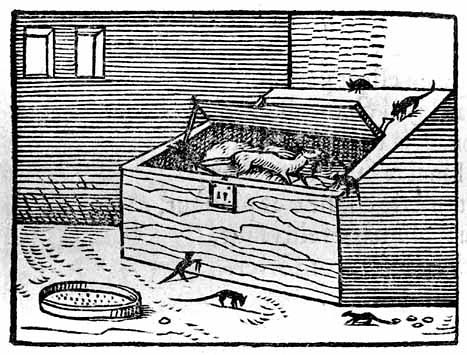HODIE: Nonae Martiae, the Nones of March - and yes, the Ides are coming up - they will be on March 15.
GOOGLE BOOKS: Today's Google Books are Pettigrew's Chronicles of the Tombs and Leich's Sepulcralia Carmina.
MYTHS & LEGENDS: The art image for today's legend shows The Judgment of Paris; you can also see the legends for the current week listed together here.

TODAY'S DISTICHS & EMBLEMS: All the distichs come with vocabulary lists!
RHYMING DISTICHS: The two new Rhyming Distichs are Amittit totum, Amittit totum qui mittit ad omnia votum; / Omnia qui quaerit, omnibus orbus erit; and Si mala quis faciat, Si mala quis faciat, sibimet solet ipse nocere; / Eius in exemplo debes nocitura timere.
CATO'S DISTICHS: The two new Cato Distichs are Iudicium populi, Iudicium populi numquam contempseris unus: / Ne nulli placeas, dum vis contemnere multos; and Fortius ut valeas, Fortius ut valeas, interdum parcior esto: / Pauca voluptati debentur, plura saluti.
MARTIAL'S DISTICHS: The two new Martial Distichs are Quid me, Thai, Quid me, Thai, senem subinde dicis? / Nemo est, Thai, senex ad irrumandum (this is a naughty one!); and Nuper erat medicus, Nuper erat medicus, nunc est vispillo Diaulus: / quod vispillo facit, fecerat et medicus.
OWEN'S DISTICHS: The two new Owen epigrams, with Harvey's English versions, are Spiritus Sanctus, Ut semper veniunt ad candida tecta columbae, / Ingreditur sanctus candida corda Deus.; and Possum, Volo, Nolo: Anomala, Quod volo non possum, quod possum nolo vicissim. / Tota hominis vita est nil nisi nolo, volo.
ROLLENHAGEN'S EMBLEMS: The two new emblems are Sacrificium Deo Cor Contribulatum, Hostia grata Deo mens vero attrita dolore; / Cum delicta premunt, hostia sacra Deo; and Cosi Di Ben Amar Porto Tormento (yes, an Italian title for this one, from Petrarch), Musca velut sequitur flammam ac sese iniicit igni, / Sic Veneris telis laeta iuventa perit.
CAMERARIUS'S EMBLEMS: The two new emblems are Ad Sidera Vultus, Sursum oculos, O Mens, vani obliviscere mundi; / Te manet in caelis non peritura domus; and Cursu Praetervehor Omnes, Quantumvis humilis, cursu tamen anteit omnes / Struthio: sic virtus quolibet alta loco est. And really: ostriches do run fast!

TODAY'S MOTTOES & PROVERBS:
TINY MOTTOES: Today's tiny motto is: Insisto firmiter (English: I stand steady).
3-WORD PROVERBS: Today's 3-word verb-less proverb is Suus cuique mos (English: To each his own custom)
AUDIO PROVERBS: Today's audio Latin proverb is Magnus liber magnum malum (English: A big book is a big evil). To read a brief essay about this proverb and to listen to the audio, visit the Latin Via Proverbs blog.
PUBLILIUS SYRUS: Today's proverb from Publilius Syrus is: Necessitatem ferre, non flere addecet (English: It is better to endure what is necessary, not to bewail it).
ERASMUS' ANIMALS: Today's animal proverb from Erasmus is Duos insequens lepores, neutrum capit (English: Chasing two rabbits, he catches neither; from Adagia 3.3.36).
TODAY'S FABLES & STORIES:
ANECDOTE OF THE DAY: Today's anecdote is Fabricius et Pyrrhus, a story of honor in Rome's war with Pyrrhus.
FABULAE FACILES WIDGET: The fable from the Fabulae Faciles widget is Aquila et Vulpes, a story of the fox's love for her offspring and a very evil eagle (this fable has a vocabulary list).
MILLE FABULAE: The "chunk" of Mille Fabulae et Una today is Fable 541, Luscinia et Acanthis, through Fable 550, Psittacus et Turtur, including Pavo Deplumatus, the sad story of a peacock who gave away his feathers.
AESOP IN ENGLISH VERSE: Today's fable from the English verse widget is The Ass and the Gipsies, in which the old priests of Cybele have now been rendered as "Gipsies."
MILLE FABULAE WIDGET: The fable from the Mille Fabulae et Una widget is Mustela et Mus Grandaevus, the story of the weasel and a wise old mouse who knows his enemy, even in disguise: Mustela, inveterata nec iam amplius mures venari praevalens, arte iuvari voluit ut vitam habere posset. Igitur in farina se coniecit et abscondit, ubi murium frequentiam esse scivit. Ibi ergo in insidiis latitans, mures sine labore capiendos exspectavit. Cepit itaque tres iuvenes et minus cautos mures. Tandem venit grandaevus mus et circumspectus, qui de laqueis et muscipulis non semel evaserat, vidensque illam insidias habentem, cognita fraude eius, sic eam allocuta est, “Minus cautos mures decipere quidem potesti; sed me minime capietis. Ego enim vos intus in cute novi.”
